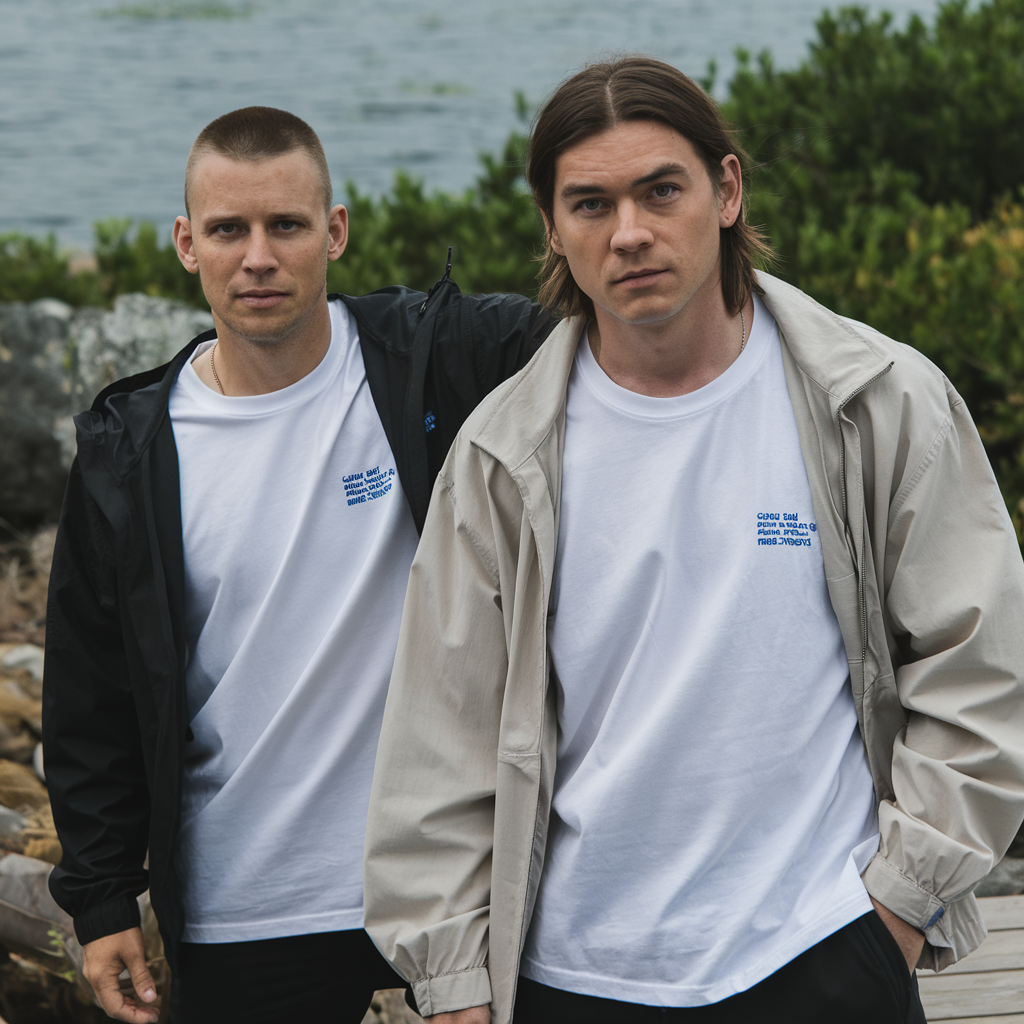In the ever-evolving landscape of fashion and self-expression, few items hold as much significance as the humble t-shirt. Far more than just a garment, the t-shirt has become a canvas for personal stories, cultural movements, and artistic expression. Over the decades, it has played a crucial role in shaping pop culture, serving as a medium through which individuals can showcase their affiliations, beliefs, and passions—be it through music, television, or social activism. This blog post delves into the importance of t-shirts in pop culture, examining how they’ve transcended their basic function and evolved into powerful symbols of identity and community.
The Role of T-Shirts in Music Culture
T-shirts have long been associated with the music scene, acting not only as merchandise but also as symbols of loyalty and connection between fans and their favorite bands. The relationship between music and t-shirts is multifaceted, rooted in history as well as emotion.
The Birth of Band Merchandise
The concept of band merchandise gained momentum during the 1960s and 1970s, when rock and roll became a cultural phenomenon. Legendary bands like The Beatles and The Rolling Stones began to capitalize on their image by creating branded apparel.
Band t-shirts served several purposes; they provided a way for fans to express their identity and affiliation while simultaneously generating revenue for the artists. Wearing a band t-shirt to a concert or out in public was an unspoken acknowledgment of loyalty to the music and its message.
As the punk movement emerged in the late 1970s, DIY culture permeated the music scene. Bands such as Sex Pistols and Ramones encouraged fans to create their own custom shirts, leading to a surge of individual expression that further solidified the band’s connection with their audience.
Iconic T-Shirt Designs that Shaped Music History
Several t-shirts stand out as iconic representations of music history. The classic black t-shirt emblazoned with a white logo of a band like AC/DC or Nirvana has become synonymous with rock culture. These designs are not just for aesthetics; they convey a sense of belonging to a larger community.
For example, consider the infamous “I Heart NY” shirt. While not directly tied to a band, it exemplifies the crossover between city pride and musical heritage, especially given New York’s status as a hub for various genres, including hip-hop and punk. Similarly, the “Tour Dates” t-shirts that feature a list of locations where a band will perform create an intimate bond between the fans and the musicians, almost making the wearer feel like part of the journey.
Furthermore, brands like Threadless and Etsy have allowed independent artists to create unique takes on band t-shirts, giving rise to a platform where creativity meets commerce. This evolution continues today, where collaboration between artists and brands yields strikingly fresh designs that resonate with younger audiences.
T-Shirts as Political Statements in Music
Beyond mere fashion statements, band t-shirts have often served as platforms for political expression. Many musicians use their merchandise to raise awareness about social issues or promote charitable causes.
A notable example is the “We Are the World” campaign in the 1980s, which featured an all-star lineup of musicians raising funds for famine relief in Africa. The accompanying t-shirts were not just souvenirs but powerful symbols of unity and social consciousness.
Bands such as Rage Against the Machine and Public Enemy are known for their politically charged messages conveyed through their t-shirt designs. Wearing these shirts can serve as a form of protest, allowing fans to express solidarity with the band’s beliefs, even after the show has ended. In this regard, t-shirts become tools for activism, sparking conversations around critical societal issues.
The Influence of T-Shirts in Television and Film
Just as music has utilized t-shirts as a form of expression, television and film have also embraced them as potent symbols of character development, cultural commentary, and viewer engagement. T-shirts from beloved shows have frequently become trendsetters, merging style with storytelling.
T-Shirts as Character Outfits
In television series and films, character wardrobes play a vital role in establishing personality traits. T-shirts can encapsulate a character’s essence and make unforgettable statements.
Take, for instance, the iconic t-shirt worn by Joey Tribbiani in Friends that reads “How you doin’?” It perfectly encapsulates his flirtatious persona and has since become a staple for fans who wish to channel a bit of Joey’s charm. It showcases how a simple graphic can bring a character’s personality to life and lead to enduring popularity.
Similarly, in The Office, Michael Scott often sported a variety of whimsical t-shirts that depicted his quirky sense of humor. These pieces not only added depth to his character but also resonated with viewers, leading to countless memes and quotes. They demonstrate the impact of t-shirts in crafting memorable identities within the realm of entertainment.
Cult Following and Collectible T-Shirts
Certain TV shows and movies have acquired cult followings over the years, and the t-shirts designed around them often become sought-after collectibles. Fans are eager to wear designs that reflect their devotion to the series or characters, thus creating a tangible connection to the narratives they cherish.
Shows like Stranger Things have successfully tapped into this market by offering vintage-style t-shirts that evoke nostalgia while appealing to modern sensibilities. The show’s 1980s setting aligns perfectly with retro t-shirt designs, allowing fans to celebrate their love for both the storyline and the era.
Likewise, franchises such as Star Wars and Harry Potter have capitalized on fan enthusiasm through merchandise, including t-shirts that feature famous quotes, logos, and character imagery. Wearing these shirts becomes a badge of honor, symbolizing participation in a larger fandom and fostering community among enthusiasts.
The Cultural Commentary of T-Shirt Designs
In many cases, t-shirts inspired by film and television series transcend mere branding and become vehicles for cultural commentary. They reflect broader societal themes and issues that resonate with audiences.
Consider The Simpsons, known for its satirical take on American life. T-shirts featuring quotes or images from the show often invoke discussions about contemporary problems, from consumerism to politics. By wearing these designs, fans engage with the show’s underlying messages and provoke thought and dialogue.
Furthermore, documentaries and films centered around social issues often produce t-shirts to accompany their release. For example, Black Panther showcased intricate designs that highlighted African culture while promoting conversations about representation and identity. The t-shirts became wearable art, allowing viewers to express their thoughts on topics well beyond the screen.
T-Shirts as Symbols of Social Movements
Throughout history, t-shirts have served as powerful symbols for social change and activism. Their ability to convey messages quickly and efficiently makes them effective tools for raising awareness and fostering solidarity.
The T-Shirt as a Protest Tool
From the civil rights movement to LGBTQ+ rights, t-shirts have played a significant role in protests and demonstrations. Activists have leveraged the power of t-shirts to capture attention and communicate their cause.
For instance, during the 1960s civil rights movement, t-shirts featuring slogans like “I Am a Man” were worn by protesters demanding equality. These shirts served as visual statements, amplifying the voices of marginalized communities and uniting individuals under a common cause.
More recently, t-shirts have been instrumental in the
MeToo movement, enabling supporters to display solidarity with survivors of sexual harassment and assault. The phrase “Time’s Up,” prominently featured on many shirts, sparked conversations surrounding workplace equality and reform.
The Fashion Industry’s Response to Social Issues
Fashion brands have increasingly recognized the impact of t-shirts in promoting social causes. Collaborations between designers and activists have led to impactful merchandise campaigns that not only generate revenue but also support important initiatives.
Brands like Patagonia and Ben & Jerry’s have produced t-shirts that advocate for environmental and social responsibility. Their designs spur conversations about sustainability, climate change, and ethical consumption while encouraging consumers to align their purchasing choices with their values.
Additionally, grassroots organizations have harnessed the power of t-shirts to raise funds and awareness for their missions. From breast cancer awareness to mental health initiatives, customized t-shirts have become symbols of hope and resilience.
T-Shirts and Identity Politics
In today’s society, t-shirts serve as manifestations of identity politics, allowing individuals to proudly embrace their backgrounds, cultures, and experiences. They offer people the opportunity to express their beliefs in an accessible manner.
Whether it’s wearing a t-shirt that promotes Black Lives Matter, feminist slogans, or messages of inclusivity, individuals can articulate their stance on pressing social issues. These shirts foster solidarity among like-minded individuals, creating a sense of community while reinforcing the notion that everyone’s voice matters.
Moreover, t-shirts featuring indigenous art or phrases in native languages contribute to the resurgence of cultural pride and recognition. By wearing these designs, individuals reclaim their history and advocate for greater awareness about indigenous communities worldwide.
The Evolution of T-Shirts in Digital Culture
With the advent of the digital age, t-shirts have undergone a transformation that has influenced marketing, design, and community-building efforts. Online platforms have created new opportunities for artists and designers to connect with consumers and share their ideas.
The Rise of E-Commerce and Customization
E-commerce has revolutionized the way t-shirts are marketed and sold. Platforms like Redbubble, Teespring, and Zazzle have empowered independent artists to create unique designs and sell them directly to consumers. This shift has democratized the industry, allowing anyone with creative talent to thrive.
Customization options, such as personalized graphics and text, have also gained popularity. Consumers enjoy the thrill of being able to design their own t-shirts, creating garments that reflect their individuality and interests. Whether it’s a family reunion, wedding, or simply a humorous inside joke, customized t-shirts have become a fun way to celebrate meaningful occasions.
Social Media Marketing and Viral Trends
Social media is another factor in the evolving landscape of t-shirts. Platforms like Instagram, TikTok, and Twitter provide avenues for users to showcase their favorite designs, sparking viral trends and fads.
Influencers and celebrities often endorse specific t-shirts, causing them to fly off the virtual shelves in record time. A single post featuring a trendy t-shirt can create a buzz, leading to widespread demand and a rush to purchase.
Moreover, hashtags related to popular t-shirt campaigns can unite individuals under a common banner, amplifying the original message behind the design. Movements like “Fashion Revolution” have used social media to encourage transparency in the fashion industry, promoting ethical practices while showcasing eye-catching t-shirts.
The Impact of Sustainability in T-Shirt Production
As awareness of environmental issues grows, many consumers are becoming more discerning about their purchases. Consequently, sustainable t-shirt production has gained traction, with brands prioritizing eco-friendly materials and ethical manufacturing processes.
This shift reflects a growing demand for conscious consumerism, where individuals seek to make informed decisions about their clothing choices. T-shirts made from organic cotton, recycled fabrics, and non-toxic dyes are becoming increasingly sought after, allowing consumers to express their values through their wardrobe.
Additionally, companies that champion sustainability can craft compelling narratives around their products, attracting consumers who wish to align with brands that prioritize positive change. T-shirts serve as both fashion statements and statements of principle, reinforcing the idea that purchasing decisions can contribute to a better world.
Conclusion
The t-shirt, once seen merely as a casual piece of clothing, has transformed into a dynamic artifact reflecting personal identity, cultural movements, and societal change. Its significance extends far beyond fabric; it is intertwined with music, television, activism, and individual expression. Whether worn as a tribute to a beloved band, a statement of political support, or a symbol of community solidarity, t-shirts encapsulate the ever-evolving fabric of pop culture. As we continue to navigate an increasingly complex world, the humble t-shirt will undoubtedly remain a powerful tool for connection, communication, and activism, allowing us to express our beliefs, passions, and identities in ways that resonate deeply with ourselves and others.


